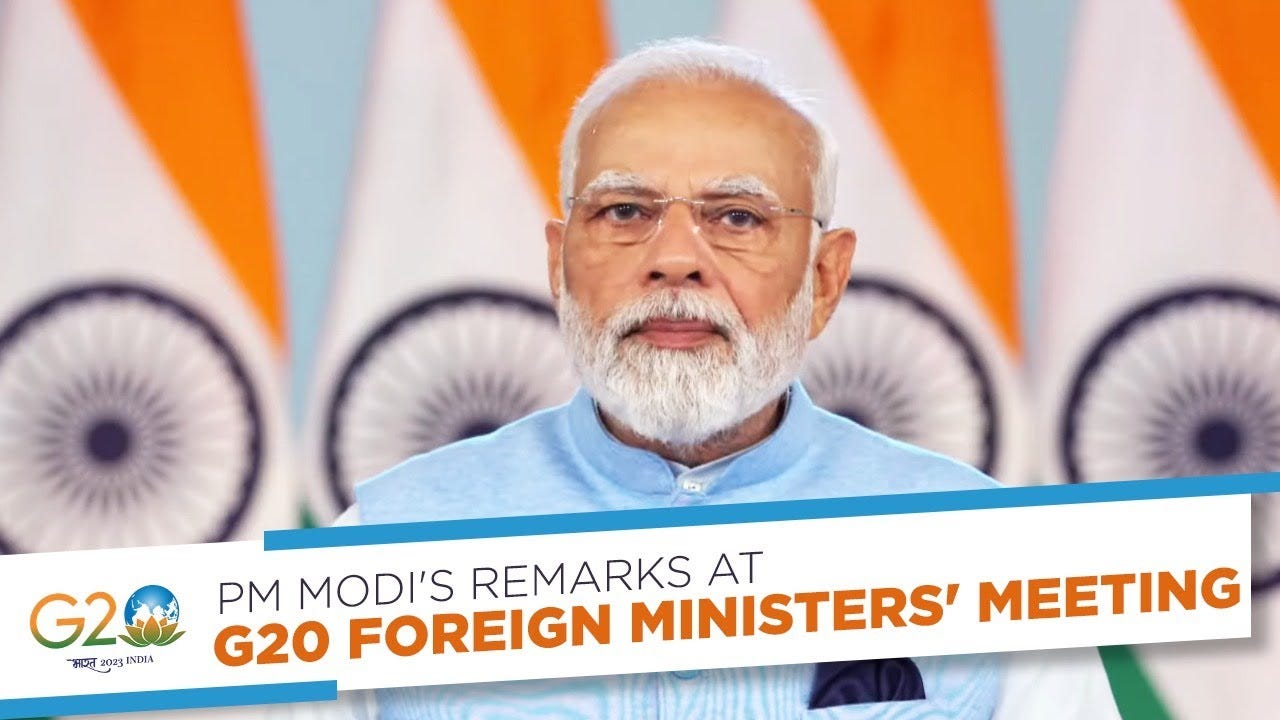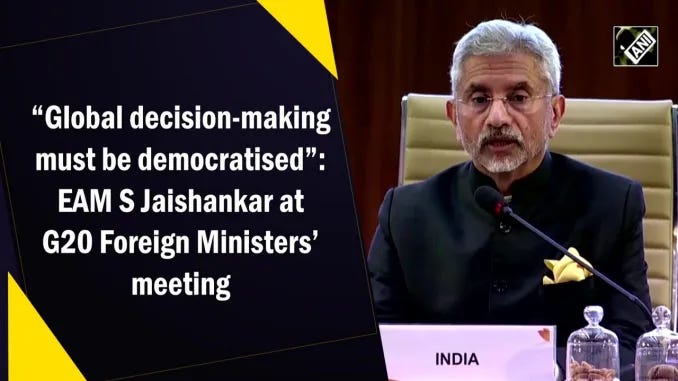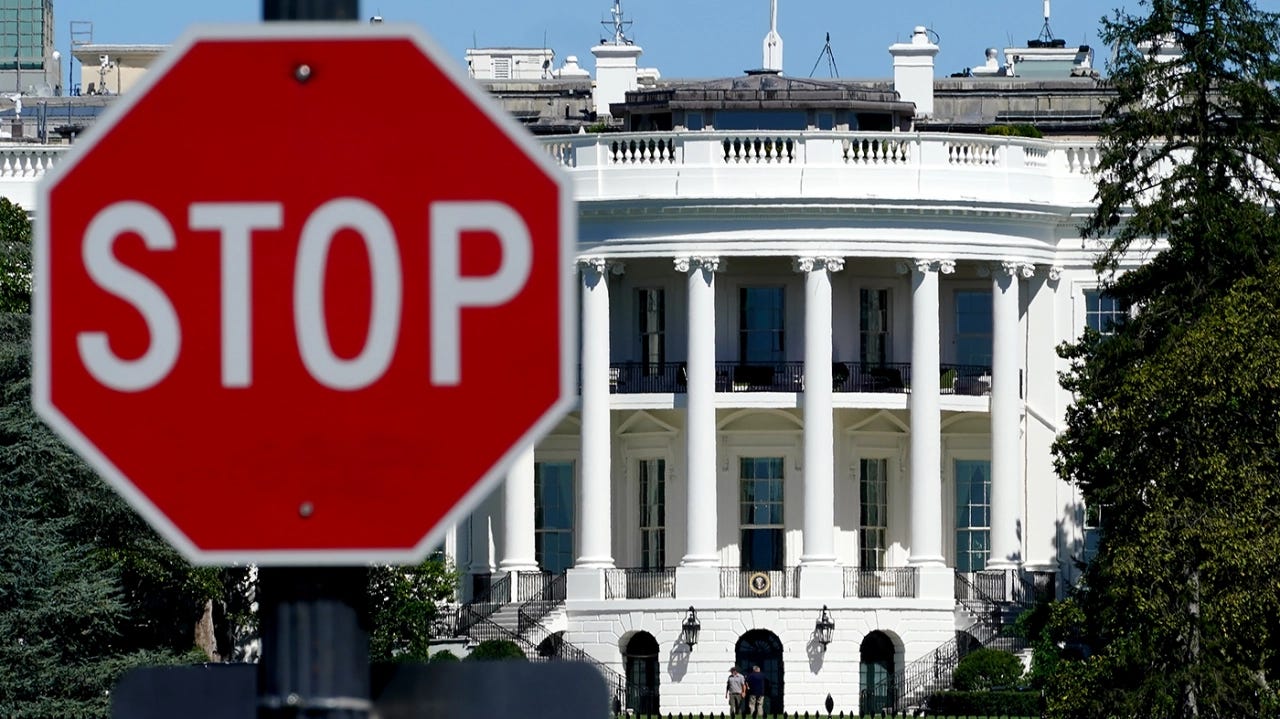Fragments and Fissures
Modi on US unilateralism, US is a National Emergency for all, US mercantilism, China's "stunning lead", TikTok causes US neuralgia, CHIPs apartheid is US innovation
UPDATE: US leadership is deaf, dumb and blind. PM Modi calls out failing multilateralism and the mirage of US leadership. The Global South is wresting global governance from a geriatric US irreversibly set on a course for auto-destruction. The US’ failed proxy war on Russia is entering its pen-ultimate phase of peace negotiations guided by the Global South.
The National Emergency powers of the US president display all the hallmarks of desperation. US escalation in both Ukraine and Taiwan is a recipe for two-front war disaster - The forces of two or more allied parties usually simultaneously engage an opponent in order to increase their chances of success. The opponent consequently encounters severe logistic difficulties, as they are forced to divide and disperse their troops, defend an extended front line, and is at least partly cut off from their access to trade and exterior resources. The US perspective that it holds the central position is strategically weakened by three oceans; thus, it has no advantage from interior lines of communication. Moreover, US allies are increasingly afflicted by economic, political and industrial headwinds, while Russia, China and their Global South partners continue to gain economic, industrial, trade and technological strength. Read today’s Long Mekong Daily for an insight into why the US and its former imperial and colonial G7 allies are lost at sea.
Modi to G20 Foreign Ministers
India has selected the theme of ‘One Earth, One Family, One Future’ for its G20 Presidency. It signals the need for unity of purpose and unity of action.
I hope that your meeting today will reflect this spirit of coming together, for achieving common and concrete objectives.
We must all acknowledge that multilateralism is in crisis today.
The architecture of global governance, created after the Second World War, was to serve two functions.
First, to prevent future wars by balancing competing interests.
Second, to foster international cooperation on issues of common interests.
The experience of the last few years – financial crisis, climate change, pandemic, terrorism, and wars – clearly shows that global governance has failed in both its mandates. We must also admit that the tragic consequences of this failure are being faced most of all by the developing countries.
After years of progress, we are at risk today of moving back on the Sustainable Development Goals.
Many developing countries are struggling with unsustainable debt, while trying to ensure food and energy security for their people.
They are also the ones most affected by global warming caused by richer countries.
This is why India’s G20 Presidency has tried to give a voice to the Global South.
No group can claim global leadership without listening to those most affected by its decisions.
You are meeting at a time of deep global divisions. As Foreign Ministers, it is but natural that your discussions are affected by the geopolitical tensions of the day. We all have our positions and our perspectives on how these tensions should be resolved. However, as the leading economies of the world, we also have a responsibility towards those who are not in this room. The world looks upon the G20 to ease the challenges of growth; development; economic resilience; disaster resilience; financial stability; trans-national crime; corruption; terrorism; and food and energy security.
In all these areas, the G20 has capacity to build consensus and deliver concrete results.
We should not allow issues that we cannot resolve together to come in the way of those we can. As you meet in the land of Gandhi and the Buddha, I pray that you will draw inspiration from India’s civilizational ethos - to focus not on what divides us, but on what unites us.
In recent times, we have seen the most disastrous pandemic of a century.
We have witnessed thousands of lives lost in natural disasters.
We have seen global supply chains break down during times of stress.
We have seen stable economies suddenly overwhelmed by debt and financial crisis.
These experiences clearly show the need for resilience – in our societies, in our economies, in our healthcare systems, and in our infrastructure. The G20 has a critical role to play in finding the right balance between growth and efficiency on one hand, and resilience on the other. We can reach this balance more easily by working together. That is why your meeting is important.
I have full trust in your collective wisdom and ability. I am sure that today’s meeting will be ambitious, inclusive, action-oriented, and will rise above differences.
I thank you and wish you all the best for a productive meeting.
Read more here.
Jaishankar to G20 Foreign Ministers
It is indeed a great pleasure to welcome you all to the G20 Foreign Ministers’ Meeting in New Delhi. Thank you all for being here.
Before I commence proceedings, let us observe a minute of silence in memory of the many who lost their lives in the devastating earthquake that hit Türkiye and Syria. Our deepest condolences to the bereaved families. Excellencies, may we all please rise.
I thank the Prime Minister for his valuable guidance. I now begin the first session of G20 Foreign Ministers’ Meeting. As I do so, Excellencies, let us remind ourselves that this grouping bears an exceptional responsibility. We first came together in the midst of a global crisis and are today, once again, actually confronting multiple ones. These include the impact of the Covid pandemic, concerns of fragile supply chains, the knock-on effects of ongoing conflicts, anxiety of debt crises and the disruption of climate events. In considering these issues, we may not all always be of one mind. In fact, there are some matters of sharp differences of opinions and views. Yet, we must find common ground and provide direction, because that is what the world expects of us.
Colleagues, as we look ahead, there are both pressing and more systemic challenges that we all confront. The future of multilateralism depends very much on our ability to strengthen it in a changing world. Food and energy security are immediate anxieties, magnified by recent events. But they do have long-term repercussions and solutions. And development cooperation is part of that larger solution that we are deliberating upon today.
Colleagues, the current global architecture is in its eighth decade. The number of members of the United Nations has quadrupled in this period. It neither reflects today’s politics, economics, demographics or aspirations. Since 2005, we have heard sentiments for reform being expressed at the highest level. But as we all know, these are not materialized. The reasons are no secret either. The longer we put it off, the more the credibility of multilateralism stands eroded. Global decision making must be democratised if it has to have a future.
Our agenda for today’s discussions include the challenges of food, fertilizers and fuel security. These are truly make or break issues for developing countries. We heard their concerns directly in January this year through the Voice of Global South Summit. Such issues should not be relegated to the periphery of the international discourse. They are infact, crucial to the global economy and must be treated as such. Indeed, we urge that they be central to any decision making. Along with that, the world must also strive for more reliable and resilient supply chains. Recent experience has underlined the risks of being dependent on limited geographies.
Excellencies, all of us individually and collectively have an obligation to contribute to international growth and prosperity. They are implemented through sustainable partnerships and goodwill initiatives. On its part, India has undertaken development projects in 78 countries and has actively encouraged exchanges and capability building. During the Covid pandemic, we made a conscious effort at contributing to global solutions even while looking after our own. Today’s situation demands that we continue to live up to our international responsibilities. The G20 must be sensitive to the priorities and economic concerns of all our partners, especially those more vulnerable. We must ensure demand driven and sustainable development cooperation based on country ownership and transparency. Respect for sovereignty and territorial integrity are essential guiding principles for such cooperation.
Excellencies, as G20 Foreign Ministers, we can send a collective message affirming our determination to address the complex challenges that we face at this juncture. I look forward to our deliberations in this regard.
Read more here.
The USA presents a National Emergency for all countries
The Whitehouse national emergency extension places extraordinary power in the hands of one man - the US president - to unilaterally decide the fate of countries and populations for which he has no mandate from their people. The statement by Prime Minister Modi (see above) clearly rejects the notion that a sitting US president should hold such powers over citizens of other countries.
“No group can claim global leadership without listening to those most affected by its decisions.”
President Biden has sent a notice stating that the national emergency originally declared in Executive Order 13660 of March 6, 2014 under President Obama, which was expanded in scope in a series of other executive orders, is to continue in effect beyond March 6, 2023.
The actions and policies of persons that undermine democratic processes and institutions in Ukraine; threaten its peace, security, stability, sovereignty, and territorial integrity; and contribute to the misappropriation of its assets, as well as the actions and policies of the Government of the Russian Federation, including its purported annexation of Crimea and its use of force in Ukraine, continue to pose an unusual and extraordinary threat to the national security and foreign policy of the United States.
Therefore, I have determined that it is necessary to continue the national emergency declared in Executive Order 13660 with respect to Ukraine.
A Guide to Emergency Powers and Their Use
One for All or All for One
It pains me to write yet another column criticizing an administration I have supported from the beginning, but on trade it is increasingly clear the Biden folks have lost their way and have embarked on a path that will ultimately do more harm to our interests than good. A twenty-first century trade policy is beginning to look like the nineteenth century, where might made right and the big countries did what they wanted at the expense of the small ones.
There are ironies here because President Biden by all accounts, as well as his own statements, is a confirmed multilateralist; yet in the trade area he continues to take steps that are not only unilateral but which undermine the rules-based system we have spent so many years defending.
Every country from time to time breaks the rules, and others are not shy about calling them out. The United States is no exception on either front, but the current and previous administrations have taken rule-breaking to a new level. The best examples are Trump’s tariffs imposed for national security reasons and those imposed on China. Some of the former don’t even pass the most basic laugh test. Not labeling Hong Kong products “Made in China” is a national security threat? Please.
The Biden administration has been marginally less obvious than that, but its affection for Buy American restrictions and discriminatory tax credits based on domestic content requirements is no less offensive and will almost certainly end up in litigation at the World Trade Organization (WTO), just as Trump’s tariffs have. One can argue that Biden’s goals are noble—creating U.S. manufacturing jobs—but in reality they are just as selfish as Trump’s. Both try to distort the trading system, not to mention market economics, to benefit the United States at the expense of everybody else. This is hardly an example of multilateral cooperation at its best.
Read full commentary here.
China’s 'stunning lead' in key technologies
China had established a "stunning lead in high-impact research" under government programs against the West, The Australian Strategic Policy Institute (ASPI) said. China has a "stunning lead" in 37 out of 44 critical and emerging technologies as Western democracies lose a global competition for research output, a security think tank said on Thursday after tracking defense, space, energy and biotechnology.
The Australian Strategic Policy Institute (ASPI) said its study showed that, in some fields, all of the world's top 10 research institutions are based in China. The study, funded by the United States State Department, found the United States was often second-ranked, although it led global research in high-performance computing, quantum computing, small satellites and vaccines.
Western democracies are losing the global technological competition, including the race for scientific and research breakthroughs […] China had established a "stunning lead in high-impact research" under government programs.
The report called for democratic nations to collaborate more often to create secure supply chains and "rapidly pursue a strategic critical technology step-up."
ASPI tracked the most-cited scientific papers, which it said are the most likely to result in patents. China's surprise breakthrough in hypersonic missiles in 2021 would have been identified earlier if China's strong research had been detected, it said.
"Over the past five years, China generated 48.49% of the world's high-impact research papers into advanced aircraft engines, including hypersonics, and it hosts seven of the world's top 10 research institutions."
In the fields of photonic sensors and quantum communication, China's research strength could result in it "going dark" to the surveillance of Western intelligence, including the "Five Eyes" of Britain, the United States, Australia, Canada and New Zealand, it said.
National talent flows of researchers were also tracked and monopoly risks were identified.
China was likely to emerge with a monopoly in 10 fields including synthetic biology, where it produces one-third of all research, as well as electric batteries, 5G, and nanomanufacturing.
Read ASPI report here and Jerusalem Post article here.
Whitehouse sets 30-day deadline for purging TikTok app from US federal agency devices
The White House has given US government agencies 30 days to ensure they do not have the Chinese-owned app TikTok on federal devices and systems. In a bid to damage China’s tech champions [Huawei], all federal agencies must eliminate TikTok from their phones and systems and prohibit internet traffic from reaching the company.
The ban, ordered by Congress late last year, follows similar actions taken by the EU, Taiwan and Canada, which issued its own ban on the app for government devices earlier on Monday. The Canadian ban was issued "without citing any specific security concern or contacting us with questions," a TikTok spokesperson said.
The White House's memo — while impacting a tiny portion of TikTok's US user base of more than 100 million people — adds fuel to calls for an outright ban on the video-sharing app.
TikTok, owned by the Beijing-headquartered company ByteDance, says the concerns are fuelled by misinformation and has denied using the app to spy on Americans. Congress in December voted to bar federal employees from using the Chinese-owned video app on government-owned devices, and gave the Biden administration 60 days to issue agency directives.
The vote was the latest action by US lawmakers to crack down on Chinese companies amid national security fears that Beijing could use them to spy on Americans.
Read full article here.
Clues to the U.S.-Dutch-Japanese Semiconductor Export Controls Deal Are Hiding in Plain Sight
On October 7, 2022, the Biden administration upended more than two decades of U.S. trade policy toward China when it issued sweeping new regulations on U.S. exports to China of advanced artificial intelligence (AI) and semiconductor technology. These export controls were designed after consultation with key U.S. allies, but the United States originally implemented them unilaterally.
This was a major diplomatic gamble.
In the face of rapidly advancing Chinese AI and semiconductor capabilities, the United States wanted to move fast, so it was willing to take the risk of moving first alone. The United States has the strongest overall position in the global semiconductor industry, and it was by itself strong enough to reshape the Chinese semiconductor industry in the short term. Over the medium to long term, however, this move could have backfired disastrously if other countries, particularly Japan and the Netherlands, moved to fill the gaps in the Chinese market that the partial U.S. exit left.
But that is not going to happen. In late January 2023, the Biden administration’s gamble paid off when the United States secured a deal with both the Netherlands and Japan to join in the new semiconductor export controls. Some officials suggested to the Center for Strategic and International Studies (CSIS) that the result of the dialogues is better characterized as an “understanding” rather than a formal deal, as some details have yet to be worked out. Regardless, the United States has secured the top three international partners needed to ensure the policy’s success. Taiwan had already made a public announcement that it would support enforcement of the October 7 regulation’s application of the U.S. Foreign Direct Product (FDP) rule.
However, the exact contours of the deal with the Netherlands and Japan are not yet publicly known. China has aggressively used traderestrictions in the past as a coercive and punitive tool of foreign policy, and all parties to the deal remain tight-lipped, likely in the hopes that this will diminish China’s appetite for retaliation. No doubt the White House would love to have had a big photo-op signing ceremony to show how its gamble on allied diplomacy paid off, but the Biden administration has remained remarkably leak-proof on the topic. The lack of leaks is happening for the same reason the administration was able to pull the deal off: they take allies’ concerns—including a desire for secrecy—seriously.
Read full report here.










